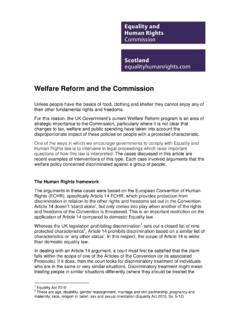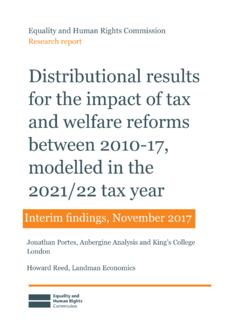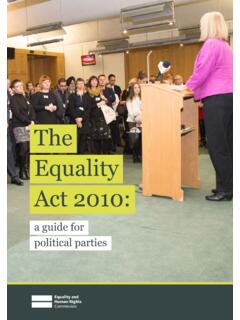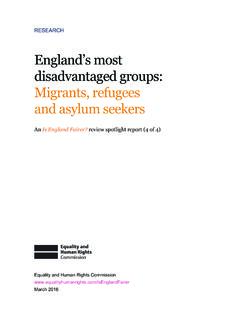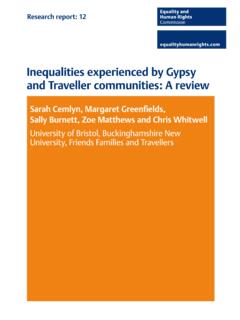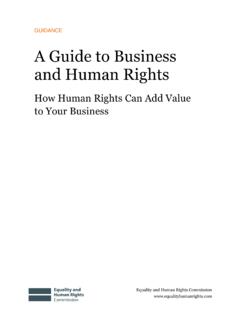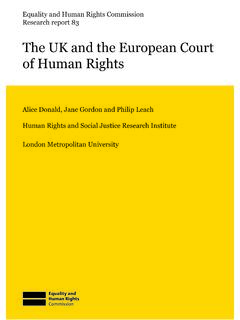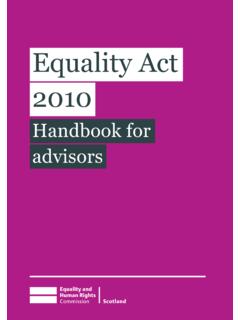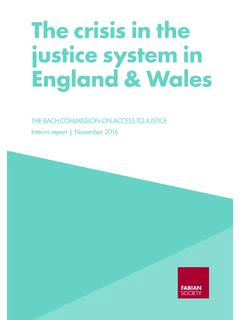Transcription of Being disabled in Britain - Equality and Human Rights ...
1 Being disabled in BritainA journey less equal2 About this publicationWhat is the aim of this publication? Being disabled in Britain is a review into disability inequality in Great Britain , offering comprehensive evidence on whether our society lives up to its promise to be fair to all its citizens. It builds on the Equality and Human Rights Commission s statutory five-yearly report on Equality and Human Rights progress in England, Scotland and Wales, Is Britain Fairer? The state of Equality and Human Rights 2015. This review also draws on new quantitative data analysis and our submission to the UN Committee on the Rights of Persons with Disabilities, published in February 2017, to present a fuller and more up-to-date examination of the key challenges facing disabled people in Britain . Who is it for?We want this report to be used by UK and devolved governments to make improvements to law and policies, by local government to ensure services meet the needs of disabled people, and by disability groups to strengthen their case for is inside?
2 The report includes chapters on six core areas of life, including education, work, health, justice and participation in politics, looking at where there has been progress and where there are still serious issues to be tackled. It also looks the experiences of those with different impairments and how these impact on people s life has the Commission produced this?The Equality and Human Rights Commission promotes and enforces the laws that protect our Rights to fairness, dignity and respect. As part of its duties, the Commission provides Parliament and the nation with periodic reports on Equality and Human Rights progress in England, Scotland and Wales. 3 Acknowledgements 4 Foreword 5 Executive summary 61.
3 Introduction 162. Human Rights standards 193. Education 23 Educational attainment for children and young people 25 Exclusions from schools 29 Bullying in schools 31 Young people not in education, employment or training (NEET) 34 Educational qualifications for adults 354. Work 39 Access to work, employment and unemployment 41 Access to apprenticeships 48 Earnings 50 Welfare reforms 535. Standard of living 61 Poverty and material deprivation 63 Availability of support 67 Housing 696. Health and care 75 Health inequalities 77 Obesity 80 Mental health 82 Social care and support 93 Healthcare for people with a learning disability 967. Justice and detention 101 Detention 103 Experience and perceptions of crime and the criminal justice system 107 Disability hate crime 112 Legal aid 1158. Participation and identity 117 Political participation 119 Access to services 124 Discrimination, abuse, attitudes and stigma 132 Endnotes 138 Bibliography 144 Abbreviations and acronyms 174 Appendix A 176 Appendix B 179 Appendix C 183 Contents4 Acknowledgements A number of people have helped realise this report.
4 Without their assistance this review would not have been would like to express our sincere gratitude to the Equality and Human Rights Commission s Disability Committee, particularly Anna Lawson, Marc Bush and Rachel Perkins, for their continuous support and guidance throughout this would like to thank NatCen for providing the new quantitative analysis presented in the report and the UK Data Service for supporting our data access thanks also go to those involved in the collection and analysis of evidence, and production of the research report (Amy Grant, Andrew Nocon, Dave Perfect, Greg Crouch, Gwen Oliver, Hazel Wardrop, Karen Hurrell, Liz Speed, Matthew McArdle, Preeti Kathrecha, Richard Keyte, Steve Kerner and Verena Br hler). We would also like to acknowledge the ongoing contribution of those working in other teams the Commission, especially Communications, Legal, Treaty Monitoring, Scotland, Wales and the Executive Leadership disabled in Britain5 Foreword from the ChairWhat is it like to be disabled in Great Britain today?
5 It s fair to say that we have seen significant improvements in the law to protect the Rights of disabled people. Twenty years ago the Disability Discrimination Act came into force, as the first step towards tackling the shocking inequalities of the past. In 2009, the UK ratified the United Nations Convention on the Rights of Persons with Disabilities (CRPD). In 2010 the Equality Act strengthened protection from disability discrimination, and five years ago the nation hosted the London 2012 Paralympic Games. There is no doubt that the Games challenged some of the stereotypes about disabled people and enabled us to celebrate their contribution to the nation. At face value we have travelled far. But have these important legal protections really changed the lives of disabled people? Have we achieved Equality , or is there still a long road ahead?In Being disabled in Britain : A journey less equal we seek to answer these questions.
6 We have analysed the latest data on the experiences of disabled people in Great Britain in more detail than has ever been done before. We look at many types of impairment in all areas of life from education, working life, standards of living, and health care, to security and participation in report shows that in many sectors we have failed to make real progress, and in some areas we have even gone backwards. disabled people are Being left behind in comparison with others in society; some groups of disabled people in particular those with mental health conditions and learning disabilities experience even greater barriers. More families that include a disabled person live in poverty; access to mental health care is inadequate; and housing and transport fail to support disabled people to live independently and fulfil their potential and conclusion we must draw from the evidence is that disabled people are still Being treated as second-class citizens.
7 Progress to date is not sufficient, and the road to disability Equality is littered with missed opportunities and failures. It is a badge of shame on our society and successive governments that this has happened. The Equality Act 2010 has still not been implemented in full, the CRPD has not been incorporated into domestic law and policy, life chances for disabled people remain very poor, and public attitudes to disabled people have changed very want this report to be the start of a concerted effort to deliver the changes that are desperately needed. The evidence can no longer be ignored. This report must be used by the UK and devolved governments to make improvements to law and policies, by local government to ensure services meet the needs of disabled people, and by disability groups to strengthen their case for change. Now is the time for a new national focus on the Rights of the 13 million disabled people who live in Britain .
8 They must not be treated any less favourably than any other citizens. Britain must be a fair and inclusive society in which everyone has equal opportunities to thrive and succeed. To achieve this we must put the Rights of disabled people at the heart of our society. We cannot, and must not, allow the next 20 years to repeat the Isaac, Chair, Equality and Human Rights CommissionForeword6 Being disabled in Britain7 Executive summaryIn Being disabled in Britain 2016: A journey less equal we assess the state of Equality and Human Rights for disabled people in Britain and set out the key areas requiring improvement. While progress has been made in some areas, the overall picture emerging from the data is that disabled people are facing more barriers and falling further behind. It is a badge of shame on our society that millions of disabled people in Britain are still not Being treated as equal citizens and continue to be denied the everyday Rights non- disabled people take for granted, such as Being able to access transport, appropriate health services and housing, or benefit from education and employment.
9 The disability pay gap is persistent and widening, access to justice has deteriorated, and welfare reforms have significantly affected the already low living standards of disabled people. It is essential that as a society we recognise and address these structural problems urgently and comprehensively. We are calling for a new national focus on disability Rights , so that disabled people are no longer treated as second-class citizens .The key challenges to disability equalityIn our review Is Britain Fairer? (EHRC, 2015), we presented the key Equality and Human Rights challenges for all protected characteristic groups in Britain , and concluded that greater effort was needed to identify the scale and nature of the issues affecting disabled people. This report builds on that evidence and also draws on new quantitative data analysis and our submission to the UN Committee on the Rights of Persons with Disabilities, published in February 2017, to present a fuller and more up-to-date examination of the key challenges facing disabled people in Britain .
10 Our purpose is to report our findings, set out the challenges for the future, and invite all concerned to address the issues by identifying and implementing the necessary solutions. This report does not speculate on the impact of proposed future legislative or policy changes, nor try to explain the causes of differences, or offer policy report sets out evidence-based findings in six key areas of life: education, work, standard of living, health and care, justice and detention, and participation and identity. It highlights the key issues described on the next page which are affecting the lives of disabled people in summaryEducational attainment of children with Special Educational NeedsNon-disabledSEN EducationDisabled pupils in England, Wales and Scotland have much lower attainment rates at school than non- disabled pupils, and are significantly more likely to be permanently or temporarily excluded. Furthermore, there is a need to address bullying experienced by disabled children and the levels of support they are England and Wales, in 2014/15 the educational attainment of children with Special Educational Needs (SEN) was nearly three times lower than for non- disabled children.
